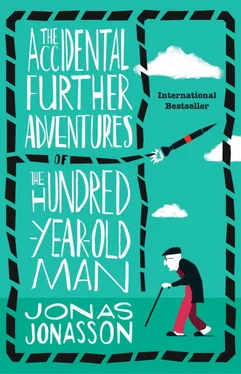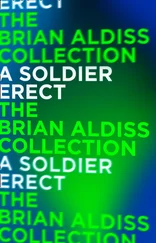Julius found Allan’s inexplicable calmness a little bit helpful. Perhaps the champagne could take care of the rest. ‘Pass me the bottle, please,’ he said quietly.
And he took four liberal gulps without bothering to use a glass.
Allan was correct: the gas did run out before land was in sight. The tank began to sputter and the flame danced irregularly for some time before it went out completely, just as the friends managed to drain the contents of bottle number one.
It was a gentle journey down to the surface of the Indian Ocean, which, that day, was practically a Pacific one.
‘Do you think the basket will float?’ Julius asked, as the surface of the water grew nearer.
‘We’ll soon find out,’ said Allan. ‘Look at this!’
The hundred-and-one-year-old had been digging through the balloon’s wooden box of supplies for unforeseen incidents. He held up a brand-new fitting for the red lever.
‘Pity we didn’t find this while there was still time. And look!’
Two rocket flares.
The crash landing in the sea went better than Julius had dared to hope. The balloon basket hit the water, plunging half a metre below the surface, thanks to its speed and weight, then tilted at a forty-five-degree angle, straightened again, and bobbed like a fishing float with ever-waning movements.
Both old men were knocked over by the strike and the angle, and they ended up in a communal pile along one of the basket’s walls. Julius was quick to get up, a knife in his hand to separate the basket from the deflated balloon, which would no longer be of any use. It was temporarily spreading out on the water but would soon sink and take both basket and old men with it if it could.
‘Well done.’ Allan praised him from where he lay.
‘Thanks,’ said Julius, helping his friend back onto the bench.
Then Julius dismantled the heavy gas assembly and dumped it into the sea along with the four bracings that had held it up. With that, the vessel suddenly weighed at least fifty kilos less. Julius wiped the sweat from his brow and sank down next to his friend. ‘Now what?’ he said.
‘I think we should have another bottle of champagne so we don’t sit around here sobering up. Can’t you fire off one of those flares while I uncork it?’
Water was already seeping in through the sides of the basket, but it wasn’t so dire that they would sink before a few hours had passed, Allan thought. Or even more, if only they had something decent to bail with. ‘A lot can happen in two hours,’ he said.
‘Like what?’ Julius wondered.
‘Oh, well, a little can happen as well. Or nothing.’
Julius unwrapped the first flare and tried to make sense of the Indonesian instructions. He was tipsy and didn’t have the energy to be as desperate as he should have been. On the one hand, he knew he was soon to die. On the other, he was in the company of a man who was possibly immortal. A man who had not been executed by General Franco, had not been locked up for life by the American immigration authority, had not been strangled by Comrade Stalin (although it had been a close shave), had not been put to death by Kim Il-sung or Mao Zedong, had not been shot by the Iranian border patrol, had not had a hair touched on his ever-balder head in his twenty-five years as a double agent in the inner circles of the Cold War, had not been killed by Brezhnev’s bad breath, and had not been dragged along into President Nixon’s downfall.
The only thing to suggest that Allan might actually die, after having failed to do so for so many years, was the fact that he was sitting in a woven basket that was taking in water, in the sea somewhere between Indonesia, Australia and Antarctica. But if the recently-turned-hundred-and-one-year-old survived this too, one might reasonably expect that Julius could ride shotgun.
‘I reckon you just have to pull on this,’ he said, tugging on the right string in the wrong position, at which the emergency flare shot into the water and kept going until it presumably extinguished at a depth of a few hundred metres.
Julius considered giving up. But Allan popped the cork on the next bottle, handed it to his friend, and asked him to take a few sips – with or without a glass – because he appeared to need it.
‘Then I think you should try again with the other flare. But feel free to aim it upwards – I imagine it will be easier to see that way.’
The official task of the North Korean bulk carrier Honour and Strength was to transport thirty thousand tons of grain from Havana to Pyongyang. A much less official task was to slow down the vessel south-east of Madagascar and, under cover of darkness, allow four kilos of enriched uranium to be brought aboard. This cargo had changed hands from courier to courier, from Congo to Burundi to Tanzania to Mozambique and on to the island east of the African continent, which Honour and Strength had a legitimate reason to pass.
The North Koreans understood that they had eyes on them. Just a few years earlier their sister ship had been caught in a rebel-controlled harbour in Libya; the captain had managed to bribe his way out, that time with a ship full of oil. To make a stop in Somalia, Iran or anywhere else with a similar reputation on the way home from Cuba would likely result in nothing but boarding by UN troops on the open sea. It had happened before, most recently outside Panama. That time there happened to be aircraft engines and advanced electronics under the grain, in violation of the current UN sanctions against the proud Democratic People’s Republic. Upset, the Koreans had informed the world that it was the world, not the Koreans, who had placed the engines and electronics there.
This time, the journey home from Cuba was going in the other direction; the earth was, after all, round. The official line was that the Democratic People’s Republic refused to allow itself to be wronged again in Panama. What was not mentioned was that they had an errand along the way.
Thus far everything had gone right instead of wrong. Captain Pak Chong-un had a hold full of high-quality grain that the Supreme Leader didn’t care about; he ate his fill anyway. But in addition there were now four kilos of lead-shielded enriched uranium, secured in a North Korean briefcase. The uranium was a necessity for the continued crucial battle against the American dogs and their allies south of the 38th parallel. The amount, four kilos, might not have been much upon which to build the nation’s future, but that was not the point. This was a test of the distribution channels as such. If all went well, the Russians promised, their efforts would be doubled many times over.
Captain Pak could feel the imperialist satellites following the ship’s path back to Pyongyang, prepared, as always, to find reasons to board, humiliate and disgrace.
Pak kept the briefcase in the safe in the captain’s quarters; the hooligans would find what they were looking for anyway, if it came to a boarding. But no sign of that yet. Still no mistakes made. Soon nothing could keep the captain from returning in triumph.
Pak Chong-un’s thoughts were interrupted when the first mate entered the room without knocking. ‘Captain!’ he said. ‘We’ve spotted an emergency flare four nautical miles to the north. What should we do? Ignore it?’
Blast! Just when everything was looking so good. Many thoughts flew through Captain Pak’s head all at once. Could it be a trap? Someone who intended to seize the uranium? Best to pretend they hadn’t seen it, of course, just as the first mate had suggested.
But some people were guaranteed to see it – the Americans. From space. And they were surely taking photographs. A North Korean ship ignoring someone in distress at sea – that would be a crime against maritime law, and an enormous PR disaster for the Supreme Leader (while Captain Pak himself would face a firing squad).
Читать дальше
Конец ознакомительного отрывка
Купить книгу












